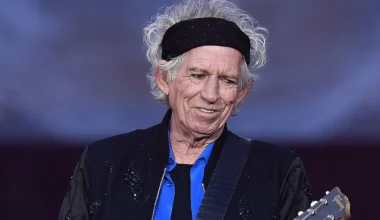In the expansive realm of the music industry, some bands stand as enduring pillars, navigating challenges and evolving eras. The Rolling Stones, with their iconic presence, have firmly engraved their legacy into the history of rock and roll.
Enduring through controversies, lineup changes, and the ebb and flow of time, the Stones have persevered, leaving their mark on the 21st century through their music and live performances.
Their profound influence has garnered admiration from budding musicians, sparking aspirations of attaining similar heights of achievement. A few have indeed succeeded, not by imitating the Stones, but by forging their own distinctive paths.
Yet, within the candid and occasionally provocative world of Keith Richards, the legendary Stones guitarist, an unexpectedly unique perspective emerges.
Famous for his unvarnished viewpoints about fellow musicians, Richards has always been forthright in expressing his opinions about his contemporaries. From David Bowie to Led Zeppelin, Metallica to Black Sabbath, there appears to be no topic off-limits. His critiques, delivered with his characteristic candidness, have become as integral to his public persona as his music.
Surprisingly, one band that has found itself under Richards’ critical gaze is The Grateful Dead, an iconic figure in the tapestry of classic rock. Emerging alongside the Stones in the mid-1960s, The Grateful Dead rose to prominence with their eclectic sound and extensive jam sessions – a stark departure from the Stones’ musical philosophy.
Richards’ evaluation of The Grateful Dead is candid and succinct: “The Grateful Dead is where everybody missed the mark. Just noodling around for hours on end. Jerry Garcia, uninteresting stuff, man. My apologies, Jerry.”
In a realm where The Rolling Stones’ lengthiest track, ‘Goin Home,’ barely surpasses ten minutes, Richards’ sentiments about The Grateful Dead’s marathon performances are understandable. The Dead’s compositions like ‘Playing In The Band’ and ‘Dark Star,’ each extending beyond 45 minutes, are quite distinct from the concise style of the Stones.
Nonetheless, the world of music thrives on its array of viewpoints and the resilient spirit of artists. Jerry Garcia, the frontman of The Grateful Dead, accepted Richards’ critique with grace, ensuring it never overshadowed his admiration for the Stones.
Garcia’s admiration for the Stones reached its zenith when he covered their 1967 track ‘Let’s Spend the Night Together’ in 1989. Additionally, he infused his unique touch into ‘Connection,’ a Stones’ composition, performed with his other band, New Riders of the Purple Sage. This gesture not only showcased his respect for the Stones but also emphasized the intricate web of musical connections that transcend personal viewpoints.
In the end, the convergence of Keith Richards’ candid commentary and Jerry Garcia’s gracious response unveils the intricate dynamics that form the foundation of the music world. Individual preferences and divergent styles inject vibrancy into the tapestry of creativity, proving that even amidst differing outlooks, the heart of music continues to beat fervently.





